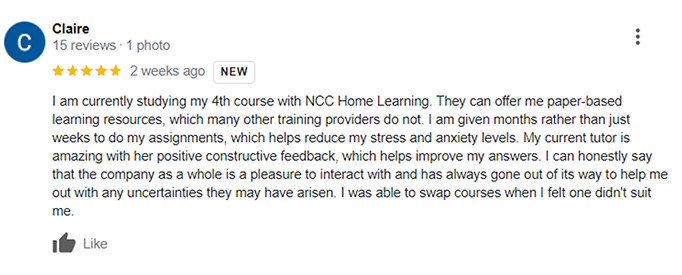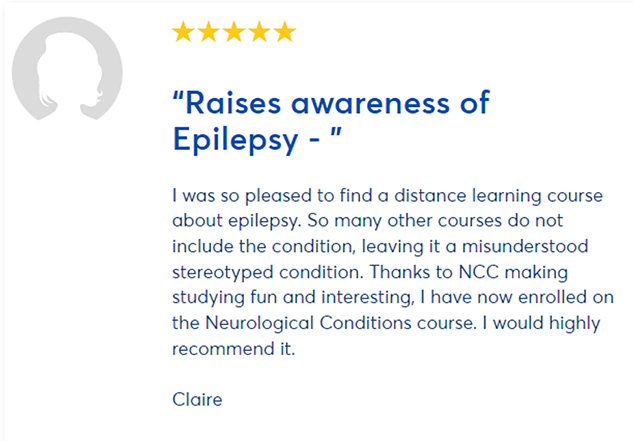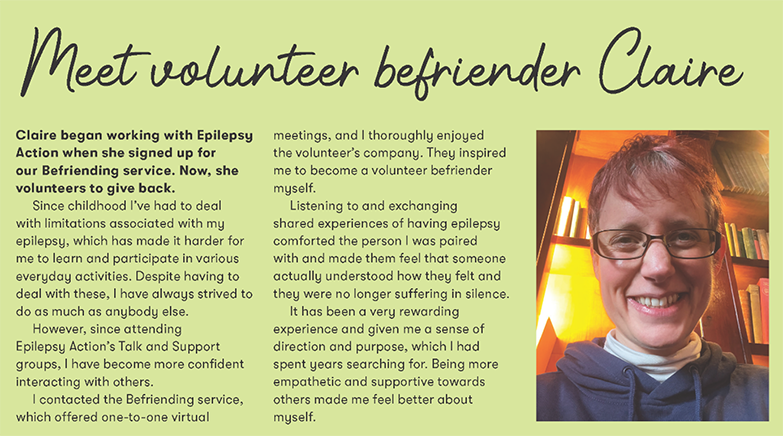Celebrating our learners’ achievements

At NCC, we take pride in our learners’ achievements, and we’re particularly thrilled to see how one learner has applied her educational journey to give back through volunteering. It’s truly inspiring to witness the impact she’s making, especially in her support for Epilepsy Action, a charity close to her heart. We wholeheartedly celebrate her dedication and the invaluable contribution she’s making to both her own growth and the welfare of others, alongside recognising the commendable efforts of Epilepsy Action.
Claire approached us following extensive research. She expressed her desire to undergo formal training in Understanding Epilepsy, aiming to attain an endorsed qualification along with a certificate as proof of her training. Claire is aware that while an endorsed qualification isn’t regulated, it can still serve as valuable evidence of acquired knowledge, potentially aiding in securing a spot in higher education. We’ve seen numerous learners utilise their endorsed qualifications from NCC to successfully gain admission to university.
Meet Claire an NCC learner

“I have learned about different people in society by studying courses online. Understanding people’s differences and learning how to adapt when interacting with them, can help eliminate the stereotypes and myths about different mental health conditions, neurological conditions, learning disabilities or specific learning difficulties and help remove any unnecessary anxieties that may be caused by misunderstanding. The more disability is shown in society, the more normal and accepted it can become. If people with disabilities separate themselves from the rest of society they become segregated, their conditions will remain stereotyped and misunderstood. NCC’s courses about Neurological Conditions and Understanding Epilepsy have been extremely interesting for me personally.
Understanding Epilepsy
Epilepsy is a neurological condition that today is still unfortunately too often stereotyped and doesn’t get enough awareness. Charities such as Epilepsy Action attempt to fill the gaps left by other services. The befriending service is led by trained volunteers who give up their spare time to support those who seek emotional support for whom traditional counselling or Cognitive Behavioural Therapy doesn’t work. Sharing experiences of having epilepsy can help someone feel more connected and understood. Befriending has given me a sense of purpose and direction, which has improved my mental wellbeing dramatically. Knowing that I have improved another person’s day purely by keeping them company for 30-45mins on the phone or video call is so rewarding. Being able to change my epilepsy from a negative experience into something positive has been made easier by Epilepsy Action’s volunteering opportunities, which I am always grateful for.
I am now studying QLS Level 2 Introduction to Counselling, in which I have learnt about listening skills and the advantages and disadvantages of different types of counselling and which has also been interesting and useful for my befriending role at Epilepsy Action. I am now wondering what future courses may be able to improve my skills even further. I do have an add-on course lined up called CPD Acquired Brain Injuries, which should complement the other courses well. I have come to the conclusion that I am naturally closer to a supporting, advisory role than a counselling, coaching role.”
Claire’s reviews
Claire has kindly provided a Google 5-star review of her experience with NCC:
NCC was the only distance learning company she could find offering a course designed for Epilepsy, an area frequently overlooked in disability training. Our collaboration with NCFE, a prestigious Awarding Organisation boasting over 150 years of educational support, enabled us to develop this specialised course.
This is what Claire had to say about studying “Understanding Epilepsy” with NCC:
The Benefits of Volunteering with Epilepsy Action
Volunteering alongside Epilepsy Action not only brings about positive change in the lives of individuals but also serves as a catalyst for personal development and overall well-being. According to their recent survey, an overwhelming 83% of volunteers reported feelings of personal accomplishment, heightened confidence, and fulfilment in their respective roles. For example, a research volunteer underscored how volunteering fosters a sense of belonging, bolsters confidence, and expands knowledge. Similarly, a Talk and Support Group volunteer emphasised the increase in self-assurance and skills as a direct result of their impactful contributions.
Additionally, numerous volunteers expressed that their involvement in volunteering activities is empowering and contributes significantly to their sense of self-value.
Volunteering offers avenues for skill development, meeting new people, and enhancing wellbeing. The diverse range of roles caters to various interests, schedules, and availabilities, whether it’s one-to-one support, group assistance, campaign involvement, or online awareness initiatives.
In addition to the personal benefits, Epilepsy Action is committed to supporting volunteers throughout their journey, ensuring they have the necessary resources to excel in their roles.

In today’s world, being a volunteer is really important for making society better. Whether it’s helping out locally or dealing with big global problems, volunteering is key. But it’s not just about lending a hand; it’s also about growing personally and learning new things. With online learning becoming more popular, people can use the internet to learn new skills, which can make their volunteering efforts even more effective.
Online Learning: Helping People Learn New Skills
Online learning has changed education a lot by offering loads of different courses on lots of topics. Whether you want to get better at technical stuff like coding or improve your communication and leadership skills, there’s a course for you. The great thing about online learning is that you can do it at your own pace, from anywhere, and fit it around your other commitments. Plus, there are different ways to learn, like watching videos, doing quizzes, or joining discussions.
Popular NCC Courses
Learning Skills for Volunteering
Online learning helps volunteers learn specific skills they need for their roles:
- Technical Skills: Knowing about technical stuff is important for many volunteering projects, like making websites or analysing data. Online courses in programming, web development, and design can help volunteers become experts.
- Communication and Leadership: Good communication and leadership are crucial for volunteering. Courses on speaking in public, solving problems, and managing teams teach volunteers how to express themselves, work with others, and lead projects.
- Understanding Different Cultures: In a diverse world, it’s important to understand different cultures when volunteering. Online courses on cultural diversity and inclusion help volunteers connect respectfully with different communities.
- Disability Awareness: Knowing about disabilities helps volunteers include everyone. Disability training teaches volunteers how to accommodate different disabilities and be respectful and understanding. This makes volunteering opportunities open to everyone and makes the experience better for both volunteers and those they help.
- Project Management: Being good at managing projects is important for successful volunteering. Online courses teach volunteers the skills they need to plan and carry out projects effectively.
When volunteers combine this extra training with their hands-on experience, it can really help them in their careers and open up more opportunities.
Making a Difference through Volunteering
By using online learning, volunteers can learn skills that make a real impact. Whether they care about protecting the environment or fighting for fairness, online learning helps volunteers connect with communities and make positive changes. Well-trained volunteers also make volunteering projects more successful, which leads to lasting change and a better society for everyone.
Online learning is a powerful way to improve volunteering and create social change. By learning new skills through online courses, volunteers become better at what they do and can tackle important issues, making the world a better place. Let’s use online learning to support volunteers and make our communities stronger.
The Impact of Disability Awareness in the Wider Community
Every day, individuals with disabilities that are not immediately visible often face the challenge of dealing with misconceptions and discrimination. This was highlighted in a recent article I came across, where a person with cerebral palsy was mistaken for being intoxicated. However, by fostering greater awareness and understanding of disabilities, La Quinta management has set a remarkable example of what inclusivity can achieve. Their efforts have not only created a welcoming environment for members of the community with disabilities, significantly enhancing their mental health and well-being, but it also undoubtedly benefits their business. Building a more inclusive community can only lead to positive outcomes.
The article in question is: The Essex restaurant that transforms into a nightclub for people with disabilities every week
This article and its content have been approved by the charity Epilepsy Action
As a childcare provider, what can you do to ensure your services are accessible when it comes to providing childcare for special needs children? From interactive learning to more flexible timetables, we cover the basics of offering childcare provision that is truly inclusive. Defined by the Department of Health as a “significantly reduced ability to understand new or complex information, to learn new skills, with a reduced ability to cope independently”, there are thousands of child in the UK with some form of diagnosed learning disability.
Like all children, they need to play and learn. For many parents of children with learning disabilities, the sad truth is that finding a childminder or day nursery with the staff and skills to look after their child is difficult.
Offering childcare for special needs children means adapting provision so that they are safe and nurtured, whilst being able to safely access play and learning activities.
Every child has a unique personality and special skills so how as a childcare provider can you provide the childcare for special needs children that so many parents are looking for?
Plan together
Every child has different needs and for a child with a learning disability, these needs can be complex and profound. This doesn’t mean that childcare provision is not to be found but it does mean making changes.
Adaptations can be anything from the amount of exercise they have to the kind of activities they want to do and more. For example, a more flexible timetable ensures learning stays on track but accommodates the challenges that some children with learning disabilities can face.
Plan the provision with the parents or caregivers and seek advice too from their social worker if they have one and other professional sources.
Small changes, big impact

For some children with a learning disability, a quiet and calm space is just as important as plenty of activity and friends.
Some childcare providers have professed to not being able to accommodate children with special needs or disabilities because the adaptations are too big, too expensive or too disruptive to make.
But research and real-life case studies have shown that small changes have a huge impact. Quiet space is ideal for any child but for a child with a learning disability, their need for calm space can be frequent.
Invest in accessible play equipment
Play equipment and toys should be accessible to every child that a nursery or childminder cares for. And yet, so many ‘mainstream’ toys are simply not accessible or suitable for a child with a disability.
Consider, for example;
- Improving lighting in playrooms so that a child with visual issues can see items better
- Use different colours to define different areas, using bright, happy colours in strong tones for playrooms and more muted colours in other areas to denote a change in use
- Consider the flooring too – is it non-slip? Are there obstacles to walking or using walking aids from one room to another? How does it really look to a child who is not as quick in processing visual information and clues
Inclusivity
Inclusivity is not just about ensuring that staff understand how to interact with children with disabilities – it is about the other children you care for at the same time too.
Having said that, children rarely see the differences as this trailer from the BBC’s Everyone Welcome campaign highlights. When asked what makes them different, none of the children pointed out that their friend was in a wheelchair or their friend has Down Syndrome or their friend was a different colour or gender to themselves.
But we need to make sure as adults, that we continue to model this behaviour and it starts with the language that we use to interact and encourage children to play and connect with each other.
Grow your own skillset for childcare for special needs children to accommodate their needs
However, we also need to recognise that for childcare staff, working with and caring for a child with learning disabilities can be daunting, more so when they feel unprepared for and unsupported.
Online childcare courses and childminding courses are available for specific topics, such as working with children with physical disabilities as well as learning disabilities, as well as topics such as Autism and ADHD.
The better trained a childcare worker is, the more prepared and skills they are for creating a safe and nurturing play environment that is truly inclusive and accessible for all children.
Charities and support groups also advocate that alongside being skilled and trained, childcare workers shouldn’t be frightened of asking questions or seeking feedback from parents, caregivers or the child, if this is appropriate.
Every child has the right to play, to be safe and to be nurtured and not excluded from activities because they have a disability, physical or otherwise. And childcare providers have a responsibility to offer a fantastic learning and play environment for every child.
As opposed to the standard route of a single-honours course at a university straight from college, many people have alternative educational experiences, either through choice or circumstance. This blog explores why being an interesting candidate with your own story is so important, and how they can improve your employability. But, just what is employability?
For most of us, investing in education is as much about satisfying our thirst for learning as it is about getting good grades and a good job.
For a long time, the pathway from school to university to a career was prescribed. You completed GCSEs, followed by a slew of A levels, applied to a shortlist of favoured universities and degree courses, got accepted, got your head down for the duration of the degree and came out the other side with a world-class degree under your cap and mortarboard.
Entrenched in tradition, when other styles of courses started to come along, such as ACCESS for those who had been out of education for more than three years, to night schools, distance learning and online courses, there was an elitist attitude that was hard to shake.
This came down to value, and how much commentators ascribe to your educational journey. Was studying three A-levels better than an ACCESS course? Do online courses have the same value and prowess as a course taught in the traditional classroom?
From a modern standpoint, it is hard to imagine why we didn’t value alternative pathways to qualifications. Thankfully, those that show contempt for educational prowess that only took the traditional route are now few in number. For those that did take an alternative route to qualifications, employers are now realising that they bring many qualities to a role.
What Is Employability?
The employability of a candidate for a job is the skills and personal attributes that make them more likely to earn employment and be successful in that field. These attributes and understandings will benefit the employee, their workforce, the community and the economy.
Therefore, employability is not simply about getting a job. It’s about the range of skills and attributes you have that will allow you to be successful throughout your working life.
Achievements, Not Just Qualifications

Now you know what employability is, now it’s time to find out how to improve your employability. Employers no longer just want a list of qualifications on a CV – did they ever really want that? – they want to see achievements, as much as they want to understand your story. Because, behind every qualification and course listed on your CV, there is a story – your story. And, to improve your employability, you need to tell it.
So, what are employers really looking for when we say achievements, not just qualifications?
LIFE
Life happens, the good, the bad and the ugly. From personal hardships to financial issues, there are many reasons why students choose or ‘have to’ take an alternative educational path.
And this is not a bad thing. In fact, it shows initiative and ability to adapt to what life throws your way. As much as we try and engineer our lives for the greater good, stuff happens. From a death in the family to gowing up in care, there are many reasons why some students have no control over the hand that life deals them.
Rather than remaining trapped, you decided to make changes, and this takes courage and determination, as well as a super-dose of commitment.
This ability and desire to adapt is something that no employer wants to be without.
ABILITY TO ASK FOR HELP
When you ‘go it alone’ so to speak, you act on your own best assumptions. But there are times that you need help. And you must find it.
This means asking for help, not just from ‘anybody’, but from people and organisations that offer the advice and support you need. This shows resourcefulness, as well as determination in the pursuit of your wider goals.
Knowing how to research information, who to contact and so on, are all skills that an employer covets and values in their staff. This doesn’t mean that someone who followed the traditional path doesn’t have these skills or abilities, but for someone following a self-determined route to success, this resourcefulness will have been utilised many, many times over the course of their studies.
A DETAILED CV
Employers look for experience and achievements outside of courses and qualifications. And they look for the smaller details, sometimes hidden within someone’s journey.
For example, a detailed CV that shows you studied a degree-equivalent course part-time, whilst working part-time shows an ability to be organised, to commit, to work hard and to face challenges.
Taking a non-traditional route to qualifications? Make sure you keep your CV up-to-date with every course you do, as well as keeping accurate details of any work or volunteering you do. This creates a CV packed full of information that shows potential employers a whole range of skills and abilities.
GRADES AND PASS MARKS
Some distance learning courses on offer provide a pass or fail mark. But this doesn’t mean it is of less value than a degree marked as meeting the standard for a third, 2:2, 2:1 or a first.
But you need to show this.
For example, the Language and the Law (Forensic Linguistics) level 3 diploma is equivalent to an A-Level standard course for which on successful completion you will receive a pass. But for each unit module you successfully complete, you will receive detailed feedback from your tutor and a % mark for the assignment.
There is nothing wrong with listing these modules and the mark you got for each and flagging these up with a potential employer or calculating the average % mark for the number of assignments you complete.
When you study for qualifications, you need to ‘blow your own trumpet’, as the saying goes, you need to show the success in completing a course, whether it is one that is equivalent to an A level or level 8 course, equivalent to a Doctorate.
ENGAGING WITH LIFE, PEOPLE, ORGANISATIONS

When you receive your qualification certificate, it is a cause for celebration and rightly so. Employers want people who are qualified, sometimes with specific skills, such as computer coding and programming or someone who has passed a teaching assistant course with qualifications in working with students who have additional learning needs.
But they want to see that you have done more than just ticked boxes. They want to see that you can engage.
Alternative routes to education and vocational qualifications often involve a significant commitment on your behalf. It means long nights of studying or spending the weekend completing assignments.
But it also shows that you can juggle everything. But matching this important piece of paper is your ability to understand the real world.
If you have been employed, even in an unrelated industry or sector, you show potential employers you have already developed a work ethic. You also show you are capable of working within the culture of an organisation, and that you understand how the real world of work functions. This is known as work experience, something that other students may acquire through volunteering, for example.
As a student who has taken an alternative route, don’t underestimate your experiences of the ebb and flow of life. You will have picked up valuable skills, including transferable and soft skills (e.g. listening and communication), as well as specific ‘hard’ industry-specific skills acquired through various distance learning courses.
ORGANISATION AND PRACTICAL SKILLS
Any student will tell you that the key to success is to apply yourself wholeheartedly to the course. But how do you this?
It takes organisation and practical skills – not just understanding what these skills are but applying them.
There is a saying ‘work smarter, not harder’ and for anyone working and studying at the same time, as well as balancing family and social life, this is certainly true. There are many balls to juggle – work, study, family, social to name just a few – and to meet all the demands that these impose on you, you had to be organised.
You also had to prioritise your workload, understanding that sometimes, one had to give way to the other.
You probably also learned how to multi-task, for example writing a comprehensive assignment whilst also washing the laundry.
You also maximised time, such as listening to podcasts as research for your assignment whilst taking the bus to work. Or reading a page or two of your course manual or made notes to formulate a plan for your next assignment during your lunch hour…
… you get the picture! There is are organised and practical, and then there is applying these skills successfully in real life, skills that students of distance learning courses do all the time (but may not realise or place value on them!).
SELF STARTER
It was a phrase that was often used in job adverts and role specifications for a long time. Effectively, by prescribing that they wanted a self-starter, employers were wanting to attract candidates who could act on their own initiative within the prescribed boundaries of their role.
Being a self-starter, having the confidence to take the initiative is not something that comes naturally to many people. For those students who have studied for qualifications via a non-traditional route, the first step of enrolling on the course was done on your own initiative: no one told you to do it!
In Summary – Your Story is Just as Important and Valuable To Your Employability
Employers do look for qualifications and ‘good ones’ that are valuable and relevant to their business. But they look for more than this. They look for people’s stories and what their experiences will bring to their business. Increase your employability with some of our tips, and you’ll be a hit at your next job interview.
